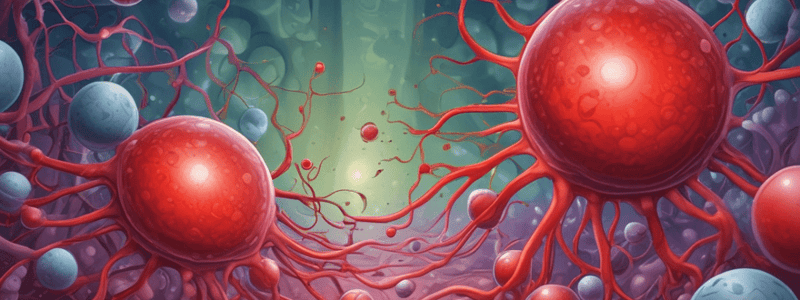Podcast
Questions and Answers
What is thrombocytopenia characterized by?
What is thrombocytopenia characterized by?
- A reduction in platelet number (correct)
- An increase in platelet production
- An abnormality in platelet function
- An increase in platelet number
What is the main mechanism of drug-induced immune thrombocytopenia?
What is the main mechanism of drug-induced immune thrombocytopenia?
- Platelet activation by drug-protein complexes
- Complement-mediated lysis
- Immune complex-mediated platelet destruction (correct)
- Direct platelet toxicity by the drug
What is the typical time frame for the onset of thrombocytopenia in people with drug-associated thrombocytopenia?
What is the typical time frame for the onset of thrombocytopenia in people with drug-associated thrombocytopenia?
- 2-3 days (correct)
- 24-48 hours
- 1-2 weeks
- 7-10 days
What percentage of people treated with heparin develop a mild, transient thrombocytopenia?
What percentage of people treated with heparin develop a mild, transient thrombocytopenia?
What is the primary cause of heparin-induced thrombocytopenia (HIT)?
What is the primary cause of heparin-induced thrombocytopenia (HIT)?
What is the primary treatment for heparin-induced thrombocytopenia (HIT)?
What is the primary treatment for heparin-induced thrombocytopenia (HIT)?
What is the consequence of the immune complexes formed in HIT?
What is the consequence of the immune complexes formed in HIT?
What is the result of the activation of platelets in HIT?
What is the result of the activation of platelets in HIT?
What is the primary cause of platelet destruction in primary ITP?
What is the primary cause of platelet destruction in primary ITP?
What is the typical platelet count in ITP?
What is the typical platelet count in ITP?
What is the age group with the highest incidence of primary ITP?
What is the age group with the highest incidence of primary ITP?
What is the classification of primary ITP based on duration?
What is the classification of primary ITP based on duration?
What is a common symptom of ITP?
What is a common symptom of ITP?
What is the site of platelet destruction in ITP?
What is the site of platelet destruction in ITP?
What is the inheritance pattern of the familial form of TTP?
What is the inheritance pattern of the familial form of TTP?
When can the acquired form of TTP occur?
When can the acquired form of TTP occur?
Flashcards are hidden until you start studying
Study Notes
Thrombocytopenia
- Thrombocytopenia is a reduction in platelet number, which can result from: • Decreased platelet production • Increased sequestration of platelets in the spleen • Destruction of platelets by antibodies • Depletion of platelets due to thrombi • Dilution of blood through multiple transfusions • Decreased platelet survival
Drug-Induced Thrombocytopenia
- Some drugs, such as aspirin, atorvastatin, and some antibiotics, can cause drug-induced immune thrombocytopenia
- These drugs induce an antigen-antibody response and formation of immune complexes, leading to platelet destruction by complement-mediated lysis
- Drug-associated thrombocytopenia is characterized by: • Rapid fall in platelet count within 2 to 3 days of resuming a drug or 7 or more days after starting a drug for the first time • Rapid rise in platelet count after the drug is discontinued
Heparin-Induced Thrombocytopenia (HIT)
- HIT is associated with the anticoagulant drug heparin
- 50% of people treated with heparin develop a mild, transient thrombocytopenia within 2 to 5 days of starting the drug
- Approximately 1% to 5% of people treated with heparin experience life-threatening thromboembolic events 1 to 2 weeks after the start of therapy
- HIT is caused by an immune reaction directed against a complex of heparin and platelet factor 4
- Treatment of HIT requires the immediate discontinuation of heparin therapy
Immune Thrombocytopenic Purpura (ITP)
- ITP is an isolated thrombocytopenia with a platelet count of less than 100,000 mL
- Characterized by: • Purpuric rash • Normal white blood cells • Normal hemoglobin
- ITP results in platelet antibody formation and excess destruction of platelets
- Primary ITP: • Affects both children and adults • Highest incidence in people older than 60 years • Classified as: • Newly diagnosed (from diagnosis until 3 months) • Persistent (from diagnosis until 3 to 12 months) • Chronic (from diagnosis until >12 months)
- Secondary ITP: • Associated with autoimmune disorders and chronic infections such as: • Helicobacter pylori • Hepatitis C virus • Epstein-Barr virus • HIV • Clinical manifestations include: • A history of bruising, bleeding from the gums, epistaxis, melena, and abnormal menstrual bleeding • Splenic enlargement may occur • Condition may be discovered incidentally or as a result of signs of bleeding
Thrombotic Thrombocytopenic Purpura (TTP)
- Familial form: • Autosomal recessive inheritance • Rare, appearing in infancy and early childhood • Symptoms occur regularly and exacerbate with stress
- Acquired form: • Not inherited • More common, occurring in late childhood or into adulthood • May be a single occurrence or many occurrences over time
Studying That Suits You
Use AI to generate personalized quizzes and flashcards to suit your learning preferences.




